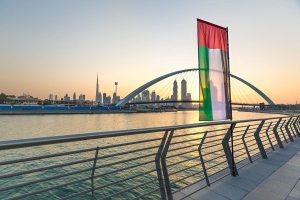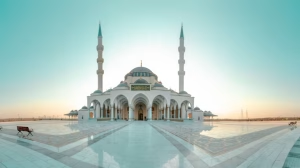Even as the Omicron variant has parts of Europe on lockdown again, the UAE has managed, so far, to stay open to most travellers while keeping infections low.
Throughout the pandemic, the United Arab Emirates has been one of the most resilient in the face of changing Covid variants, with the world’s highest vaccination rate and extensive, affordable testing. In fact, the UAE is currently ranked number one in Bloomberg’s Covid Resilience ranking, which ranks 53 countries on 12 indicators like healthcare quality, virus mortality and reopening travel. Even as the Omicron variant has parts of Europe on lockdown again, the UAE has managed, so far, to stay open to most travellers while keeping infections low.
Due to the pandemic, its most populous city, Dubai, has also transformed itself from a global tourism hub into one more invested in its own community. “We all had to work together to protect each other,” said Kathy Johnston, chief chocolate officer at Mirzam chocolate company, who has lived in the city for more than 30 years. “People are supporting more local concepts and projects with authenticity behind them. Things are moving a little slower and more considerately. Being here now feels like a different planet to two years ago, and I love it.”
Why should I go now?
For one, the weather is perfect right now, say residents. “October to May is the best time of year to visit because it’s not excruciatingly hot anymore,” said Dubai resident Tala Mohamad. That also has meant the return of outdoor events and activities and leisurely evenings spent on the city’s numerous patio and rooftop seaside lounges.
The city is also hosting Expo 2020 until the end of March 2022, a global six-month event featuring pavilions from all over the world, showcasing unique innovations and futuristic projects. “Don’t miss [the] Expo. Just don’t,” said Johnston. “Give yourself a whole week. Wait three hours in line for Japanese sushi and enjoy the date pudding with dukkah at [on-site restaurant] Baron, and dream under the stars at the Australian pavilion.”
Travel with no trace
Dubai has worked diligently over the past decade to become more sustainable, with major investments in solar energy, water conservation and green building and infrastructure. Expo 2020 is also hosting a Sustainability Pavilion, showcasing projects like solar trees that provide shade while creating energy and a huge vertical farm growing 9,000 plants and herbs.
The pandemic unexpectedly created a boom in chefs engaging with local ingredients and talent, said Johnston, with a handful of new spaces opening up in the past two years. Some of her favourites include Orfali Bro’s for its Arabic inspirations; Tresind Studio for its upscale dinner and breakfast; and The Barn speciality coffee bar and next-door HAPI for their sweet potato pancakes.
For a unique take mixing Japanese inspiration with local produce, Mohamad recommends Moonrise at the rooftop of Eden House and its omakase menu. “For example, one dish is chutoro from Spain with honey from Ras Al Khaimah [the emirate 100km north-east of Dubai],” she said. With just eight seats, it’s usually fully booked so reserve in advance.
Resident Vibha Dhawan, a travel advisor with Ovation Travel Group, recommends Boca, which uses local ingredients like salmon from the UAE’s Fish Farm and milk from local camel dairies; and The Sum of Us, one of the first cafes in Dubai to become eco-friendly by using avocado seed straws and offering 10% off to customers who bring a reusable takeaway cup.
For a more in-depth look at the city’s sustainability initiatives, Dhawan recommends checking out the Emirates Bio Farm, the largest private organic farm in the country. “Book a group tour and sunset session,” she said. “This gives you an in-depth visit around the acres of land followed by the chance to harvest your own vegetables. They also offer pop-up dining experiences throughout the year.”
To experience the natural desert of the region, she recommends the Al Maha resort and spa. Located within Dubai’s first national park, the five-star resort is dedicated to preserving the unique ecology of the desert, including the endangered Arabian oryx. A herd of 300, the largest in Arabia, now roams freely after decades of conservation efforts. On-site field guides give guided wildlife tours on foot, 4X4, camel and horseback.
For an experience in the heart of the city, the new 25hours One Central hotel, which opened in December 2021, celebrates the country’s traditions by immersing visitors in theme of hakawati, Arabic for storytelling. The experience starts in the lobby with the circular “Fountain of Tales” library with more than 5,000 books, topped with rotating art from local artists, and continues throughout the hotel with Bedouin-inspired art and décor, a tribute to both ancient and modern nomads.
Know before you go
The Omicron variant has travel restrictions changing rapidly, so check the UAE Travel to Dubai page for the latest notices and requirements. Currently, travel is open to vaccinated tourists with a WHO-approved vaccine, though visitors must undergo a rapid test on arrival. Unvaccinated travellers must provide a negative PCR test within 72 hours of departure. Travel is currently suspended for those coming from or transiting through certain African countries.
Travellers must download the Al Hosn app, the UAE’s official contact tracing and health status app, which uses a colour-coded system (grey, red, green) to reflect test results and vaccination status. The Dubai Health Authority offers the DXB Smart app, available for Android and iOS, which gives visitors real-time information about UAE’s current Covid rates, tracks test results and exposures, and is used to show vaccination status within the emirate.
Source: BBC Travel






